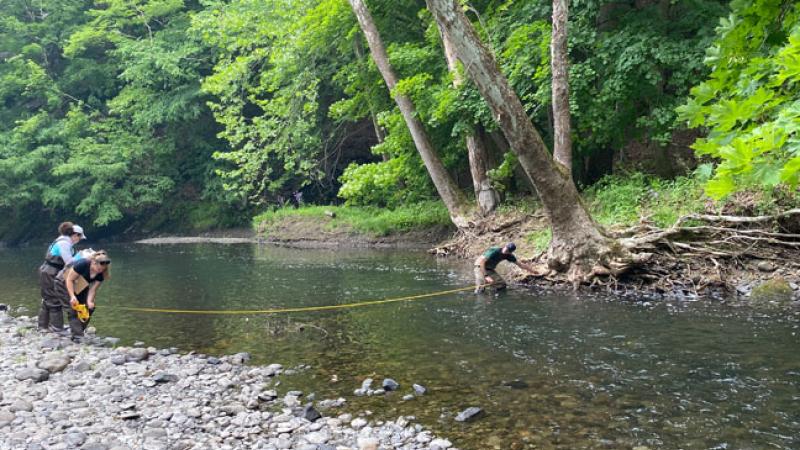July 7, 2023

This summer, some lucky Rensselaer Polytechnic Institute students have experienced a new course called Field Experiences in Aquatic Biology. Co-taught by Darrin Hunt and Jonathan Stetler, lecturers in biological sciences, the course has introduced Arch students to scientific data collection and citizen-led science. The Arch refers to the summer after sophomore year in which Rensselaer students live on campus and benefit from focused attention from professors and experiential learning. This new course was filled overnight!
During the course, students are monitoring a vast spread of streams at the Poestenkill Watershed. They use sensors to monitor the water temperature and collect macroinvertebrates to assess their populations over time. Together, the data will inform an assessment of the overall health of the ecosystem. Lower water temperatures are generally more oxygen rich and healthy. Macroinvertebrates are sensitive to pollution and require a lot of oxygen, so the higher their population, the healthier the ecosystem. Factors outside of the streams, such as development and deforestation, affect the health of the aquatic ecosystem, too.
“We are working with students to assess river biodiversity at various sites throughout Troy as a proxy for water quality and to document the health of our urban streams,” said Hunt. “This will be the beginning of a long-term data collection effort that will allow us to observe changes in biotic communities and water quality over time. This effort will connect students to environmental issues, make them aware of human impacts on ecosystem health, and emphasize the importance of water quality and availability to the broader Troy community.”
“We have a sensor installed on a large rock,” said Stetler. “It connects to a phone so we can monitor the water temperature with data every 10 minutes. We are also monitoring the flow rate, depth, and width of riffles, pools, and runs. The students have learned how to take samples from disturbed areas and take counts of the different types of macroinvertebrates. Next, we will visit the Jefferson Project at Lake George with other Rensselaer students, who will not only learn from the scientists there, but also from their peers in our course how to take scientific samples.”